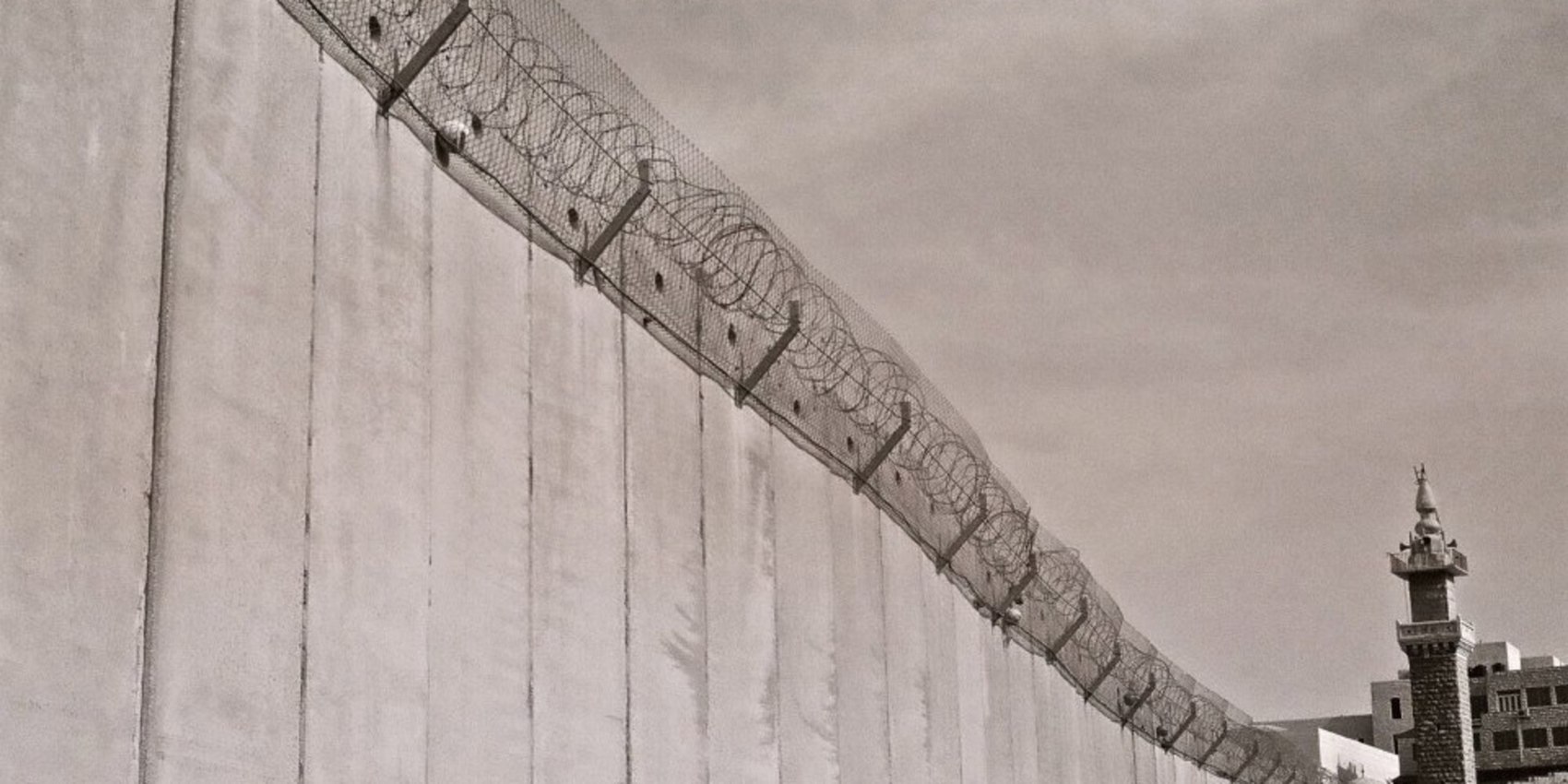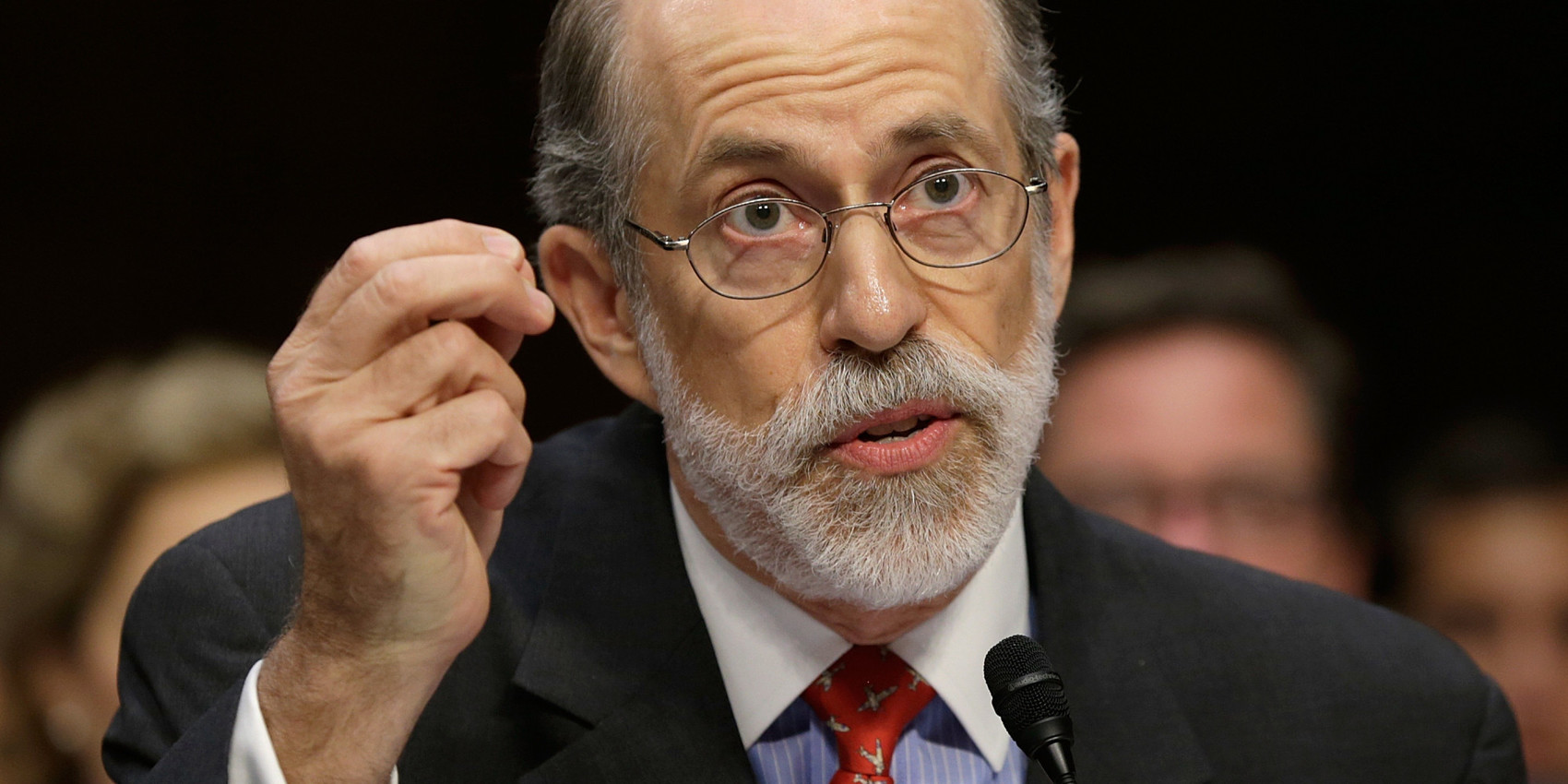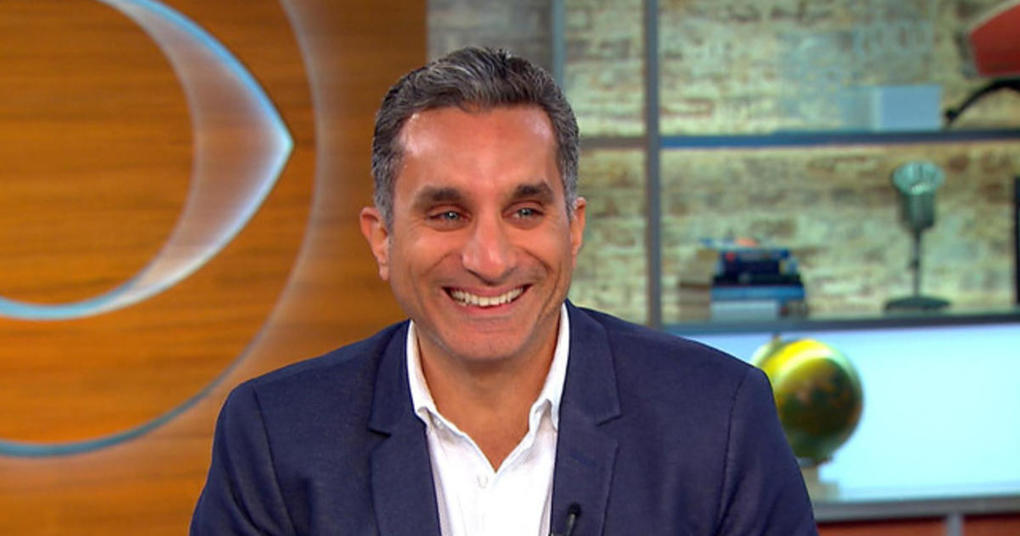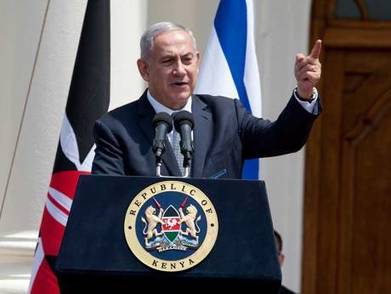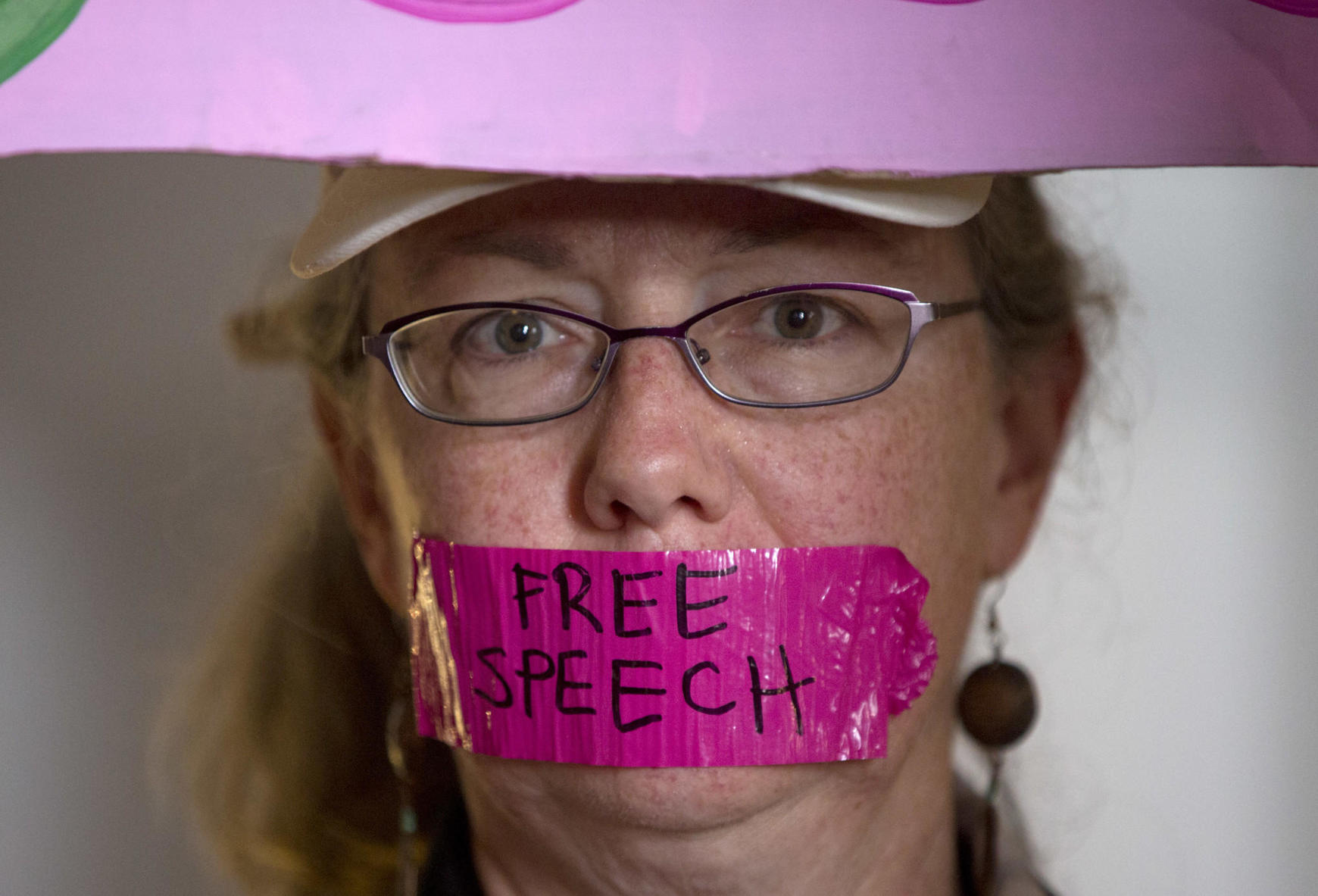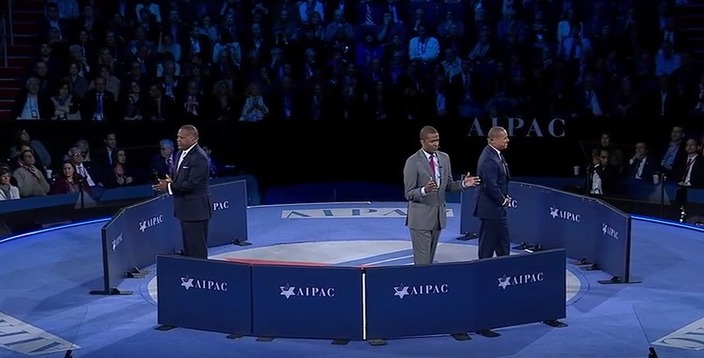
By David Harris-Gershon / Tikkun
Alternet.com
This is the story of how a powerful lobbying organization enlists black Americans – victims of oppression and state violence for centuries – to mask the suffering of another oppressed people. It is the story of how the American Israel Public Affairs Committee (AIPAC) strategically recruits and educates black leaders to defend Israel from critique. And it is the story of how Palestinians living under Israel’s occupation suffer in ways that reverberate upon America’s streets – where black bodies are bruised, bloodied and destroyed under the weight of police violence, mass incarceration, and disenfranchisement.
It is a story which begins – for our purposes – on June 9 at the Omni Shoreham Hotel in Washington, DC, where a public hearing on the Democratic Platform convened for two days of discussion and debate in advance of the Drafting Committee’s work in St. Louis at the end of June.
At this hearing, the DNC’s 15-member Platform Drafting Committee heard public testimony on and debated many aspects of the platform, working through domestic policy and foreign policy and finally arriving at Israel. When they did, Robert Wexler, President of the S. Daniel Abraham Center for Middle East Peace, sat before the committee and presented Hillary Clinton’s version of what the DNC platform should look like, making sure to list Israel’s legitimate security concerns while neglecting to articulate the suffering Palestinians endure. Needless to say, absent from Wexler’s testimony were the words “occupation” and “settlements.” Though he did make sure to condemn Palestinian civil society’s nonviolent Boycott, Divestment, Sanctions (BDS) movement, noting that Democrats must oppose outside forces pressuring Israel.
Sitting opposite Wexler was Cornel West, a prominent author, academic and BDS supporter, who resides on the Drafting Committee as one of five members appointed by Bernie Sanders. (Six were appointed by Clinton.) When Wexler finished his testimony, West had this to say:
“I think both of us can agree that a precious Palestinian baby in the West Bank has exactly the same value as a precious Jewish baby in Tel Aviv … A commitment to security for precious Jewish brothers and sisters in Israel can never be predicated on an occupation of precious Palestinians. If we’re concerned about security, it seems to me we’re going to have to talk seriously about occupation. I don’t know if you would allow the use of that word … but occupation is real. It’s concrete.”
[…]
“For too long, the Democratic Party has been beholden to an AIPAC that didn’t take seriously the humanity of Palestinian brothers and sisters. We’re at a turning point now, though of course it’s going to be a slow one in the Democratic Party … So my first question would be: one, would you argue for the use of the word occupation in the platform? And two, how would you respond to those who say for so long the United States has been so biased toward Israeli security and has not accented the humanity of Palestinians, such that to talk about evenhandedness is always a version of anti-Semitism as opposed to a struggle for justice?”
Wexler responded, saying “what you refer to as occupation” should be absent from the DNC platform. Why? To include mention of occupation and settlements would be to litigate sensitive issues which must be negotiated by Israelis and Palestinians themselves, not the Democratic Party. An absurd answer made even more so given Wexler, on Clinton’s behalf, advocated minutes before for Jerusalem to be recognized by Democrats as Israel’s capital, one such ‘sensitive’ issue.
When the public hearing had concluded, the Clinton camp’s position was known: it opposed West’s proposal to acknowledge Palestinian suffering in the Democratic Party Platform, as well as the nonviolent movement he champions. What wasn’t known was just who would prevail on this issue. What also wasn’t known at the time was that in a matter of days, AIPAC would quietly aid Clinton by enlisting black politicians and church leaders to counter West’s efforts on the Drafting Committee, as though the only natural way to counter a black intellectual is with other black intellectuals.
Bakari Sellers and the DNC Letter
Three weeks later, on June 25 in St. Louis, the 15-member Drafting Committee met to hammer out the Democratic Party’s platform, finalizing a number of issues before arriving at Israel. It was time to consider West’s proposal, to consider whether the security concerns of both Israelis and Palestinians would finally be articulated by the Democratic Party, whether the humanity of both peoples would be acknowledged.
The debate revolved around a motion proposed by West and James Zogby, President of the Arab American Institute and another Sanders appointee. It sought to have included in the platform a call for “an end to occupation and illegal settlements so that [Palestinians] may live in independence, sovereignty and dignity” as well as an acknowledgement that Palestinians “deserve security, recognition and a normal life free from violence, terror and incitement.”
Debate on the motion was emotional, with West and Zogby pleading for the Democratic Party to simply acknowledge Palestinian suffering. Here’s Zogby:
The term occupation shouldn’t be controversial. George Bush said there is an occupation, Ariel Sharon said there was an occupation, Barack Obama has said there is an occupation. There is an occupation. It denies people freedom … It’s an occupation that humiliates people, that breeds contempt, that breeds anger and despair and a hopelessness that leads to violence.
We have to be able to call it what it is. Reality has moved way beyond just recognizing Palestinians [exist]. It’s hearing their voices, understanding their pain.
West and Zogby, who pushed for the motion in committee late into the night, were fighting an uphill battle, in large part because AIPAC had already been invisibly working to ensure the motion would fail.
Days before the vote, a letter addressed to Platform Committee co-chairs Governor Dannel Malloy and Shirley Franklin made its way to members of the Drafting Committee. Written by Bakari Sellers and signed by over 60 black leaders, the letter closely mirrored Wexler’s language from his June 9 testimony. Indeed, Sellers’ letter implored members not to stray from past language on Israel, with the exception of adding a condemnation of the BDS movement. It was a thinly veiled and direct response to West; a clear effort to undermine his efforts by demonizing Palestinian nonviolence and opposing mention of the state violence done unto them.
In the letter, Sellers wrote:
“I believe that the Mideast planks of the previous platform … have served us well as a party and a country. As Democrats and proud supporters of our presumptive nominee, we would be well served to stick closely to our previous platform language.”
When newsof Sellers’ letter leaked, questions were immediately raised: Who was Sellers? Who were these black leaders opposing West by echoing Wexler, a man AIPAC recently described as “one of the stalwart leaders of the American-Israel alliance“? Why were they invested in keeping Palestinian suffering out of the DNC’s platform? And how exactly had the previous platform on Israel served these black leaders well?
In pursuit of answers, I would end up receiving a call from Sellers as I started digging, climbing down a rabbit hole at the end of which stood AIPAC and years of deeply-funded recruitment efforts in historically black colleges, universities and churches across America. Recruitment efforts about which others before me have warned, recruitment efforts now paying dividends via a Clinton-AIPAC alliance working to stem a progressive shift on Israel within the Democratic Party. An alliance now using black leaders to help erase Palestinian suffering from the party’s articulated vision of justice in the Middle East.
From Morehouse College to AIPAC
Bakari Sellers is the son of Cleveland Sellers, a famed civil rights activist widely known for his leadership role in the Student Nonviolent Coordinating Committee, one of the most impactful civil rights organizations in the 1960s.
He grew up around Denmark, South Carolina, where he resides today. It’s also where his father now lives after many years serving as Director of African American Studies at the University of South Carolina. Sellers considers his father his “number one inspiration” for the elder’s long-standing pursuit of social justice and equality, and stands committed to “creating change that benefits all persons – no matter race, color, or creed,” in large part due to his father’s influence.
If this sounds like an unlikely biography for one now deeply involved with AIPAC – an organization which denies Palestinians their humanity as a political strategy – that’s likely the point.
So how did Sellers connect with AIPAC? In 2004, after he’d been elected to the SGA presidency at Morehouse College, Sellers got a cold call from two strangers inviting him to a policy conference. These strangers, AIPAC staffers Jonathan Kessler and Michael Glassman, were reaching out to student political leaders at historically black colleges and universities across the country and inviting them to Washington, DC as part of a larger recruitment effort. (More on that later.) Sellers, who didn’t know anything about AIPAC, but loved the idea of rubbing shoulders with US lawmakers, jumped at the chance.
“The voice on the other end sounded kind of nurturing and understanding, and I said I don’t have anything to lose,” Sellers recalled thinking after the call. And so he went to DC on AIPAC’s dime. And as with many young students recruited by AIPAC, he ended up being overwhelmed by the access and experiences he gained:
There might have been ten black people at the whole [AIPAC] conference of 7,500 [in 2004], and I remember one moment that they had the roll call, but I was just so enthralled that we went to this huge dinner that they have and every member of Congress, or at least 75 percent of them, were there and I got to see Steny Hoyer again who has the best hair in Congress and, you know, I got a chance to see Condoleezza Rice and see George Bush. And the unique thing is they had this huge role call where they notified and they let the crowd know who was there and they let them know the SGA presidents they had there, but they left out the only two HBCU presidents they had.
I didn’t even recognize it, but afterwards, the staff, the executive direction of this huge organization, came and apologized and said, “We’ll make it up to you.” And I was like, “You know, don’t worry about, I don’t care.” So the next morning we’re sitting in a huge forum waiting on the president, at that time, George Bush, to speak, and after they introduced the president, they had a pause and they said, “We would also like to recognize” – as President Bush stands and waits – “We would like to recognize the SGA presidents from Morehouse College and Spelman College, Bakari Sellers and Adeola Adejobi. May they please stand.” So that attention to detail and that we made President Bush wait even just for that moment. It meant a great deal.
Sellers’ connection to AIPAC would end up meaning a great deal more. Two years later, he would become one of the youngest congressmen ever elected to the South Carolina House of Representatives, where he served the 90th district from 2006-2014. And if it weren’t for AIPAC’s fundraising and networking support, his political career may never have gotten off the ground.
“The way I’m able to communicate, the exposure, the people that I’ve met – a lot of people I’ve met at the AIPAC policy conference became a huge part of my fund-raising base,” Sellers admitted in 2009.
Now, in 2016, he sits on AIPAC’s National Council. The son of civil rights icon Cleveland Sellers, penning letters to keep the Democratic Party from recognizing that Palestinians’ rights are violated by Israel.
Or perhaps Sellers didn’t even pen the letter, but rather signed his name after an ask from AIPAC. Shaun King, a writer at the New York Daily News, emailed me that an acquaintance of his, an AIPAC staff member, had texted to say the letter had been hisbrainchild, and that every signatory had been recruited by AIPAC via its educational wing, the American Israel Education Foundation (AIEF).
Though I was unable to confirm this with King’s source, my research certainly indicates the latter to be accurate, for nearly every individual who signed Sellers’ letter, from school superintendents to state senators, have deep AIPAC roots. And as I reached out to Sellers and dozens of these signatories, asking about their connections to AIPAC and reasons for signing, I came to learn just how deep the lobbying outfit’s reach into the black community extends.
The Optics of Black Leaders Defending Israel
For over 10 years, AIEF has been recruiting students like Sellers at historically black colleges and universities through its Campus Allies Mission program, funded by Adam Milstein, an Israeli real estate investor who was convicted for felony tax evasion in 2009, and who sits on AIPAC’s National Council alongside Sellers. Milstein, it should be noted, not only has a history of rather ugly Islamophobia. He also has a history of promoting attacks against President Obama which some feel have racist undertones, and opposes solidarity between Black Lives Matter and Palestinian movements. As for the missions Milstein funds, they send black students to AIPAC policy conferences and on Israel trips, where students are given crash courses on Israeli politics and history which, impressive as they may seem to the uninitiated, are rife with right-wing propaganda. These missions also wine, dine and provide students with the type of access to US lawmakers and world leaders about which most people dare dream.
These students, some of whom come from disadvantaged backgrounds, are often swept off their feet. Sellers certainly was. So too was Vincent Evans, who as a politically-active freshman at Florida A&M University was recruited by AIPAC, and ended up traveling to DC over 10 times with the lobbying outfit during his college career. Just listen to him talk about the experience with Colorlines reporter Seth Freed Wessler:
“You’re talking about a lot of students who grew up in a socio-economic place that does not give them these opportunities,” said Evans. “We met amazing people. I met Netanyahu. In 2007 or 2008 I met all the Democratic candidates for president. My dad cried when I met Obama. [AIPAC] opens your eyes to things you’ve never seen.”
Another group which works closely with AIPAC is the Atlanta-based Vanguard Leadership Group, which has effectively connected Morehouse College students with AIEF, funneling them to conferences and into Israel advocacy roles.
So why has AIPAC strategically chosen to focus heavily on recruiting black students and leaders to be Israel advocates and defenders? Part of the answer might be simple: AIPAC is incredibly thorough. However, that cannot be the entire story, for of all the potential communities from which to draw, its non-Jewish student recruitment and engagement only has three foci: African-American, Hispanic, and Christian colleges. And AIPAC views its African-American Outreach program as a particularly important tool.
Which leads many to wonder if the lobbying organization has intentionally developed a community of black leaders to visibly shield Israel from charges of racism and aparthied. At a time in which Israel is being targeted with South-African styled boycotts, a time in which young activists see parallels between the extra-judicial killings and indefinite detentions Palestinians face and the police shootings and mass incarcerations black Americans face, are AIPAC’s determined outreach efforts a mere matter of public relations? Is AIPAC most interested in developing political connections in the black community, or in defending Israel from charges of unequal treatment through the optics of black leaders standing upon a stage?
Or writing and signing letters?
The Motion Fails
Late into the night on June 25, after debate had finally ended, the Drafting Committee defeated West and Zogby’s motion by an 8-5 vote. The platform’s initial draft would not mention occupation, nor settlements, nor any acknowledgement of or concern for the violation of Palestinian rights. What would make it into the draft, however, were calls to fight BDS and for Jerusalem to be the “undivided” capital of Israel:
A strong and secure Israel is vital to the United States because we share overarching strategic interests and the common values of democracy, equality, tolerance, and pluralism. That is why we will always support Israel’s right to defend itself, including by retaining its qualitative military edge, and oppose any effort to delegitimize Israel, including at the United Nations or through the Boycott, Divestment, and Sanctions Movement.
We will continue to work toward a two-state solution of the Israeli-Palestinian conflict negotiated directly by the parties that guarantees Israel’s future as a secure and democratic Jewish state with recognized borders and provides the Palestinians with independence, sovereignty, and dignity. While Jerusalem is a matter for final status negotiations, it should remain the capital of Israel, an undivided city accessible to people of all faiths. Israelis deserve security, recognition, and a normal life free from terror and incitement. Palestinians should be free to govern themselves in their own viable state, in peace and dignity.
While AIPAC, with an assist from Sellers and over 60 black leaders, had repelled progressive efforts for a more balanced platform plank, some progressive inroads were made, despite the BDS language. For the first time, Palestinian “dignity” and “sovereignty” were articulated, as well as their deserving “peace.”
Baby steps, to be sure. Though AIPAC hadn’t won quite yet. The full, 187-member Platform Committee still needed to vote on – or amend – what the 15-member Drafting Committee had created. This would happen on July 9 at the DoubleTree Hotel in Orlando, where the fight for a more balanced, more just platform plank, one demonstrating equal concern for Israeli and Palestinian security, would continue.
Bakari Sellers Calls
While reaching out to several black leaders who signed the DNC letter, Sellers called unexpectedly on July 5 – a day after emailing him and just four days before final deliberations by the Platform Committee.
And so I asked Sellers why he had written the letter, a letter he insisted was his idea.
“I felt that more perspectives were needed on Israel,” he said, likely referring to West. “I wanted to lend mine as somebody concerned about the security and safety of Israel and who also has compassion for Palestinian brothers and sisters?”
“If you care about Palestinians, why not support acknowledging their suffering and the occupation in the DNC Platform alongside Israeli security concerns and traumas?”
“I do think that when you talk about terms like occupation – they’re loaded,” he said. “They debunk some of the history; there are 1.8 million Arabs living in Israel – ”
“Debunk history?” I asked. “Do you not think there is an occupation in the West Bank?”
His answer was both troubling and telling. For while Sellers had preceded my questions by noting his studying the relevant issues for over10 years, his answer revealed the influence of AIPAC’s education and a tenuous handle on the nature of occupation.
“That’s a loaded question about the occupation,” he replied. “How do I want to phrase this since you are writing? There are ways to get to a two-state solution, and one is a serious discussion about settlements. Now, I don’t have all the answers. There are definitely settlements, and we have to have that discussion. For example, will Israel have to pull back? There is a military presence, yes. But there are also – how many? – some thousands of missiles being fired – ”
“That’s Gaza,” I said. “We’re talking about the West Bank.”
“Oh, right. That’s Gaza,” Sellers offered, continuing to talk about Israel’s security needs without mentioning a single Palestinian concern.
I then moved to the AIPAC’s recruitment of black leaders. “What are your thoughts on the idea AIPAC may be using black leaders to shield Israel from racism charges?”
“That’s not fair, I’m not a puppet,” Sellers responded before suggesting that he doeschallenge AIPAC when things come up, such as police brutality against Ethiopian Jews. Though as I made clear, my contention was never to suggest that Sellers, or black leaders involved with AIPAC, are mere puppets. For not only are there obvious political and financial benefits to being involved with the organization, everyone develops their own political stances. I asked about AIPAC’s principle goal in recruiting black leaders.
But Sellers, who was busy, needed to run, and I thanked him for deciding to reach out.
The next day, video emerged of Baton Rouge police literally executing Alton Sterling, a black man merely selling CDs in a parking lot. When sellers Tweeted video of the incident, as disturbing as it is essential, a follower requested that he put trigger warnings on such difficult material.
“No. This country needs to see it,” he wrote, a sentiment with which I agreed.
Though his response prompted my asking Sellers, “Why do you feel Americans should witness state violence committed against black Americans, but feel the DNC should not even acknowledge the word “occupation,” much less the incredible suffering endured by Palestinians? Do these two positions not seem incongruous to you?”
I never received a response.
Signatories Silenced by AIPAC Questions?
Over the course of a week, I sent interview requests to 30 of those who signed Sellers’ letter, nearly all of whom have associations with AIPAC. Of those, approximately a dozen replied (or in one case, staff replied) indicating they would be happy to answer written questions. And so I submitted them:
Why did you decide to sign Bakari’s letter? (Or, why do you think excluding language about settlements and the occupation from the DNC platform wouldadvance peace for both sides?)
How long have you been associated with AIPAC, did you first connect with AIPAC via AIEF, and has AIPAC funded either your campaign or any legislative trips you’ve taken to Israel?
Why do you think AIPAC strategically recruits black leaders via its African-American Outreach and Campus Allies Mission programs?
When you received Bakari’s letter to sign, who was the first person to present it to you for signature?
Even with follow-up, seeking to confirm that the questions submitted were acceptable, not a single leader chose to answer them. Including Tennessee State Senator Lee Harris, who promotes his AIPAC affiliation, Louisiana State Representative Ted James, who has traveled to Israel with AIEF, and Augusta (GA) Mayor Hardie Davis, who has gone on legislative junkets to Israel, most likely via AIPAC.
What was it about these questions which moved so many leaders to silence? I cannot say, particularly given the AIPAC affiliations of many are matters of public record and, sometimes, proudly promoted by the leaders in question. Were they taken aback by inquires about AIPAC? Inquiries about who actually asked them to sign Sellers’ letter? Inquiries about turning their backs on another oppressed people?
I wish I knew.
A Final Chance as Platform Committee Votes
As evening descended upon the full Democratic Platform Committee in Orlando on July 9, debate finally centered on foreign policy. It was time for the full committee to wrestle with whether or not the party’s platform would formally acknowledge Palestinian suffering.
Maya Berry, executive director of the Arab American Institute, rose to offer an amendment which mirrored language the Drafting Committee had already rejected.
Palestinians deserve “an end to occupation and illegal settlements so that they may live in independence, sovereignty and dignity.”
She spoke on the fact that this should not be a contentious issue – recognizing occupation – before quoting Hilary Clinton extensively, both in 2010 and in her 2014 book, in which she explicitly acknowledged occupation, named its violations, and recognized its need to end for both Israelis and Palestinians to realize peace and security.
West then rose and, with signature passion, noted that young Americans are beginning to view this issue as the South Africa of our time. He also noted that if the Democratic Party could not demonstrate balance by valuing equally the lives and aspirations of both peoples, it would be mirroring what happened some 80 years ago, a reference to its moral failures in the lead-up to and during the civil rights movement.
After West finished, Stephen Benjamin – Mayor of Columbia, South Carolina – rose in opposition as a representative of Clinton. Benjamin, a black leader from Sellers’ home state, has long been associated with AIPAC. Which is why his opposition was predictable: he argued that inclusion of the word occupation would undermine efforts for a negotiated peace, and would also reverse the hard work of the drafting committee, though that’s precisely the point of an amendment.
While he said little, his association as a Clinton delegate said too much. The amendment failed, 95-73, toppled with the help of a black leader educated and supported by AIPAC.
After the amendment’s defeat, Berry offered yet another amendment, this time focusing on Gaza and adding language calling for action to help those in distress:
“We call for an international effort to rebuild Gaza, which the UN warns could be uninhabitable by 2020, where poverty and hopelessness undermine peace and security for both Palestinians and Israelis.”
After again being passionately supported by Berry and West, another Clinton delegate, Mark Stanley, rose to oppose it, offering one of the more callous and obtuse reasons, arguing that were Democrats to open up Gaza for debate, what else would they then have to open up for debate?
It failed, 95-72.
Shouting and protests broke out. Screams and cries. It was the only time before discussion of any amendments the Chairman, Governor Malloy, had warned people things would be contentious.
After the vote, rather than contention, there was anguish.
Marc Lamont Hill
I knew what I had been witnessing, and what I had been learning about, was wrong. Though as a Jewish, ‘white’ American, I also felt some guilt, legitimate or not, about implicating black leaders in this immoral, political game. After all, the Black-Jewish alliance is strong, and goes back not just to the Civil Rights movement, but to our connection as two peoples upon whom hatred are continuously heaped.
And so I decided to speak with Marc Lamont Hill – Distinguished Professor of African American Studies at Morehouse College, author and television personality – about all of this. About AIPAC, Palestinian suffering and leaders like Bakari Sellers doing the work of a lobbying organization I believe is not just harming Palestinians, but Israel as well. Below is part of our exchange, and just some of his profound insights:
Me:
“Should African-Americans, given our country’s history of oppression, have any particular responsibility for recognizing the suffering of Palestinians?”
MLH:
Yes! The short answer is yes. Black people like all people have a responsibility to fight for justice and struggle against injustice, wherever it is. I think that the historic connection between blacks and Jewish Americans during the civil rights struggle has created a cultural connection that has, combined with the hasbara(propaganda) approach to representing the conflict, obscured the conflict for African-Americans and made them view it in a certain way. So if you already have a natural connection to Jewish brothers and sisters, and then the conflict is misrepresented, it makes it easy for black people to unreflectively attach themselves to Israel. Now, I’m not advocating that black people switch teams. We should still be interested in fighting anti-Semitism and be on the side of justice when it comes to Jewish people, because they matter. But at the same time we have to open our eyes and recognize that the kind of historical struggle that black people often liken themselves to – dislocation, marginalization, state violence – is the struggle of Palestinians. We’re much closer to where Palestinians are right now than where Israelis are. But again, that doesn’t mean that we dismiss Jewish suffering or Israeli suffering. What it does mean is that we don’t have to conflate Jewishness with Israeli state practices, and we don’t have to choose between fighting anti-Semitism and for Palestinian rights. We can do both.
Me:
“Speaking of misrepresentation, this brings me to AIPAC’s role in all of this. I’m sure you’re aware that Bakari and everyone who signed the letter are affiliated with AIPAC, most through AIEF. How do you personally feel about AIPAC enlisting black leaders to thwart attempt to have Palestinian oppression recognized by the DNC?”
MLH:
“There’s a twisted irony here that black people, who have always been the vanguard of social justice struggles in America, who have been a moral compass in terms of political action, are now being used to underwrite social injustice. It’s a dark irony which brings a great sadness. AIPAC has modeled what it means to have an organized, deeply rooted, systematic commitment to a particular worldview. It’s breathtaking how efficient and powerful AIPAC is and how effective they are. I think the key for those of us on a different side of this issue is to be equally organized and to let the truth and facts speak for themselves in full public view. Right now, I’m watching so many young students, so many black ministers, so many black politicians have their intellectual and physical labor be used in service of a project I believe is anti-democratic and counter to social justice ideals.”
Me:
“Do you think Bakari and other black lawmakers are being used by AIPAC rather than valued and if so, given these are intelligent people, why do you think they’re allowing themselves to be used in this way?”
MLH:
“First, I think there’s a willful ignorance. Saying you want to be a friend of Israel is like kissing a baby, politically. Everyone does it, everyone believes it, and there are no stakes attached. Some of it is opportunism, and a lot of it is our failure to represent the conflict in a way that is balanced and nuanced. I don’t think most black American politicians are corrupt or engaged in some kind of venal act, I think they believe the narratives they’ve been told. I do think there’s ample evidence to contradict those narratives, though when you’re being well funded, and when your election or re-election status hinges on it, it’s easy to not look for counter evidence. I just think they’re wrong, and when being wrong is lucrative, it’s easy to not try to be right.”
Me:
“There are some who claim AIPAC has targeted traditional black colleges and universities and churches to try and recruit black leaders not because of any power associated with these leaders but because having black faces on stage at AIPAC conferences hides the racism and oppression of Palestinians. People can point to a state representative on stage and say, ‘Look, black Americans love Israel. Israel’s not racist.’ Do you buy into that critique?”
MLH:
“I think that’s exactly right. Some of it is the optics of it, showing a multi-racial coalition of people fighting for a Zionist project because then it nullifies to some extent the racial issue, particularly when part of Israel’s narrative is it’s the one state in the Middle East where you can be gay, where you can be shielded from racism, where you can be protected from anti-democratic practices. So if you can model this mini-democratic experiment on stage at an AIPAC conference then it makes it harder to point out racism. People will say, ‘What are you talking about?’ … There is an important desire to have a civil rights tradition in America confirming the Zionist project. How many times have you heard, ‘Well Dr. King supported Zionism.” So the patron saint of civil rights in America supported it, so of course we want Cleveland Sellers and his son, Bakari Sellers, to support it.”
Me:
“Hypothetically speaking, given your perspective, what would you say to Bakari or to the DNC Platform Committee which you didn’t get to say, because you weren’t there, on the topic of why mentioning occupation and settlements in the DNC Platform would advance peace?”
MLH:
“We can’t have justice unless all sides are recognized and respected. In the same way that we want the PA and Hamas to recognize the State of Israel and its legitimacy, which is exactly what should happen, and the reason for that is because if we can’t recognize that Israel has a right to exist, then we’re not starting from a place of fairness or justice, or a recognition of their humanity. Similarly, if we begin our platform by not acknowledging the plight of Palestinian people, and the very real political circumstances they live under, we can’t redress it. How can we talk about reparations for Jewish brothers and sisters if we don’t talk about the Holocaust? It’s a real and human tragedy, and we need to always remember it and address it. If we don’t do that, then we can’t fix the problem. We can’t fix the problem of occupation if we pretend it’s not an occupation but a dispute, which is the language many people use. We can’t stop Israel from building and expanding settlements and further displacing people if we pretend settlement expansion isn’t happening. It’s no different than when Democrats get pissed off at the right for denying climate change. Democrats are denying the problem exists, which then undermines our ability to fix the problem. Except the difference is this isn’t an abstract, scientific argument or a historical event we’re trying to come to terms with, this is an active project … If I were on the platform, I’d tell Democratic leaders that we’re compromising our moral authority as a party.”
Why it Matters
If this were just about moving the United States closer to being about to end the occupation and Palestinian suffering, it would be enough. If this were just about moving a future Clinton administration closer to helping Palestinians suffering in Gaza, it would be enough.
But this is about, for me and for many others, not just Palestinian suffering and survival, but the suffering and survival of Israeli Jews as well.
I have long held that the only world arbiter powerful enough to compel Israel to end its occupation, dismantle settlement blocks, and reach an accord with Palestinian leaders, is the United States. I have also long held that if the US were to wield its unbelievable influence – $3 billion in military and foreign aid annually – things could change rapidly. Nonviolent Palestinian resistance, such as BDS, is partly a response to our failure as a country to be an arbiter of justice. Palestinian civil society’s move to pressure Israel through nonviolent, and likely constitutionally-protected, boycotts is not only entirely legitimate, but in many ways made necessary due to our inaction.
That organizations like AIPAC continue to support the right-wing policies of Israeli leaders like Binyamin Netanyahu, policies which are destroying both the lives and futures of Palestinians and Israelis, angers me to no end. As Israel slides farther to the right, wisps of fascism taking root, leaders rejecting two-states while also rejecting an end to occupation, it’s not difficult to see where we’re headed. And that’s worse than where we are, for both sides.
Like Marc Lamont Hill, I’m outraged that AIPAC has chosen to enlist black leaders to defend the status quo and help ensure things only get worse. And I’m disappointed with such leaders, not as a member of the black community, but as one invested both in Israel and in the realization of full rights, dignity and sovereignty for Palestinians.
As Hill stated, all we can do is educate ourselves and organize to combat AIPAC’s efforts and realize justice for all involved. After all, the Democratic Party must vote on this platform at the convention in Philadelphia soon.
I welcome that call, and stand with anyone who wants to stand with me.
Source: www.alternet.org




